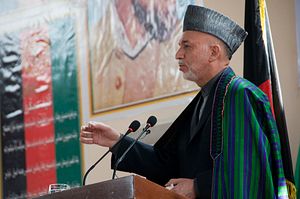As Afghanistan’s political crisis continues unabated, the New York Times reports that some members of the Karzai administration are considering seizing power.
“A coterie of powerful Afghan government ministers and officials with strong ties to the security forces are threatening to seize power if an election impasse that has paralyzed the country is not resolved soon,” the report states. It goes on to note that the officials would create an interim government after taking over, and would portray their actions as necessary to shore up democracy in the country over the long-term. The story’s reporter, Matthew Rosenberg (formerly of the Wall Street Journal, and an insightful observer of Afghanistan), also notes that the move is partially in reaction to fears that Afghanistan’s non-Pashtuns intend to seize power.
Rosenberg indicates that the security forces and President Hamid Karzai are not directly involved in the planning. However, he cites unnamed officials within the Karzai administration and Afghan bureaucracy as saying the move is being actively considered, while also citing some named officials, including Umar Daudzai, Afghanistan’s interior minister, as saying nearly the same thing, only with more diplomatic double talk.
“The debate is there and people have the right to debate, of course, particularly when they are faced with such an important national crisis,” Daudzai is quoted as saying, before adding, “But personally I prefer, and I see it in our national interest, that something come out of this election, whatever way it is.”
Although the move is apparently being considered by non-military officials, their actions would in essence amount to a coup. Indeed, preserving democracy over the long-term was the same justification (or at least part of it) used by the military juntas in both Egypt and Thailand.
Rosenberg suggests repeatedly in the article that he believes the officials were leaking the information in an attempt to pressure the two election candidates, Abdullah Abdullah and Ashraf Ghani, to reach a negotiated settlement to end the political stalemate. This is indeed possible, especially if Karzai isn’t directly involved in the planning.
Still, I find it more likely that Karzai is directly involved in planning the coup, and that he and his inner circle are trying to use the election crisis to stay in power. This is hardly a novel view. Reuters noted way back in June that many in Afghanistan believe Karzai deliberately created the electoral crisis in order to use it to stay in power. In fact, Reuters reported that “even within Karzai’s family and inner circle, many believe the president quietly engineered the electoral debacle to keep his hands on the levers of power.” I’m not sure if the Afghan president actually engineered the crisis (though I certainly wouldn’t rule it out), but I certainly believe he may be trying to exploit the opportunity that it presents.
In this regard, Karzai and his inner circle may be leaking this information in order to gauge what the U.S., regional powers and international community’s responses would be if they did seize power. In politics, this is generally referred to as a trial balloon.
It’s also possible that the information is being leaked by insiders who want to thwart the coup.
In this sense, it’s notable that shortly after the article was published, Rosenberg was barred from leaving Afghanistan, and is being interrogated by Afghan Attorney General’s office, which is demanding that he reveal the sources in the article (another win for democracy in Afghanistan!). This possibly suggests that Karzai didn’t want the information to get out, although the fact that some of his cabinet members and aides basically said the same thing on the record, it is really anyone’s guess why they are so intent on finding the leakers. The AG’s actions may be an attempt to obscure the fact that the president is part of the planning and/or that the leaks were deliberate. It’s also possible that the Karzai administration is just internally divided and the right hand doesn’t know what the left hand is doing.

































